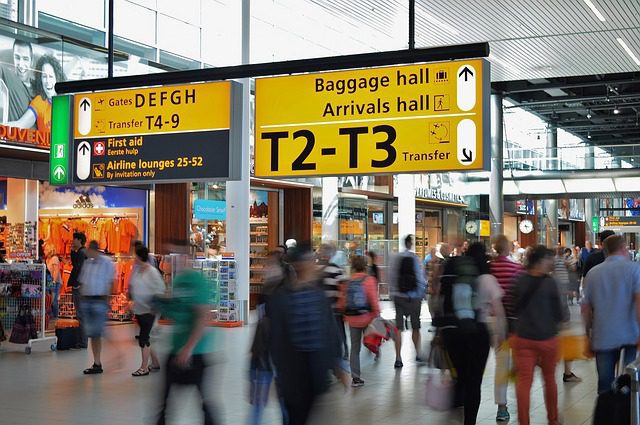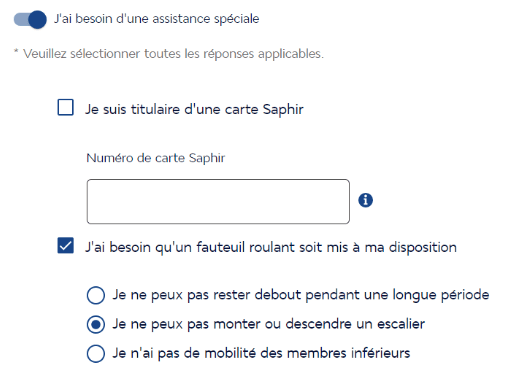PRM, what it means to travel when you have reduced mobility
Traveling when you are mobility impaired or handicapped, here is a guide on what to do
Traveling should always be a pleasure. But sometimes a trip can turn into a nightmare... Perhaps some of you have had a few physical injuries happen to you on vacation due to carelessness, eagerness or just plain bad luck. But not only that.
In this article:
You may also be a little older and not be able to walk through the long airport terminals, or face the endless lines at security checkpoints
To each difficulty a different assistance
There are different degrees of passengers with mobility impairment, IATA classifies 10 (from blindness to deafness and cognitive and mental disability, to medical assistance of stretchers)
The mildest is the one denoted as. WCHR ("wheelchair to ramp"): these are passengers typically elderly or with minor health issues who simply cannot stand for long periods of time or travel long distances independently and therefore require a wheelchair and accompaniment to the gate, but can ascend the aircraft stairs independently or with minimal support if boarded earlier or later to avoid pressure (especially when it is not possible to use fingers leading directly from the gate to the aircraft).
More complex is the treatment of the WCHS ("wheelchair to stairs"). These passengers are unable to take the stairs independently and therefore require a wheelchair and a lift to transport them to the level of the aircraft door, upon reaching which they are, however, able to reach their seats by taking a few steps or with the use of crutches.
The most serious level of care (in this context) is the "WCHC" ("wheelchair carry"). They cannot move without a wheelchair either on the ground or on board the plane and therefore require special attention to their needs during the flight.
How to apply for assistance
Each level of assistance must be requested at the time of booking (with a flag if present or by contacting the company directly by email and providing your reservation code (PNR).
Important to note that any request for assistance not included in reservation, should be Requested within 48 hours of flight departure
It is common practice (unfortunately, not all airlines have the same focus) in the booking process to flag the request for assistance field, for example:
In this case on Air France in the booking process I am asking for an assistance WCHS, ditto for Iberia.
How one should behave
Departing
The passenger will have to arrive at the airport 2 hours in advance and if able to walk go to check-in even if already done, or if unable to walk, alert them to your presence at the designated and marked points in the departure area outside the airport.
Assistance personnel, once contacted, will assist the PRM during check-in and deliver any checked baggage. Upon completion of check-in, the PRM will also be assisted during check in and boarding until he/she has taken his/her seat on the aircraft.
Passengers with disabilities or reduced mobility are entitled to use airport facilities (including lounges to which they are entitled) and will benefit from assistance appropriate to the degree of mobility noted.
Coming soon
Disembarkation operations began, PRM passenger, will need to remain seated in their seat. Whose presence the PRM is already reported to the arrival terminal staff, and the PRM will be assisted from his or her seat on the plane, during the disembarkation procedure leading from the aircraft to the arrival hall and in retrieving the checked baggage.
Finally, assistance personnel will accompany the PRM to one of the release points outside the terminal.
What to expect
Expecting that a PRM is handled by the handling company at the airport of departure and arrival, service levels are subject to peak airport transit workloads. A maximum of 30 minutes of waiting time to be picked up is to be expected.
The security check steps are conducted from a priority gate, as well as that of passport checks (there is only ONE acompanion per PRM accompanying the passenger).
Contacts of major companies
- ITA Airways: Tel: 800 936090 (Monday-Friday 09:00-20:00; Saturday, Sunday and holidays 09:00-17:00) Mail: [email protected] Passenger assistance with reduced mobility
- Lufthansa: Mail: [email protected]
- Air France: Mail: [email protected]
- British Airways: Tel: 02 69633602 Monday - Friday: 09:00-18:00
- Iberia: Application form at this link
- Ryanair: Tel: 02 30560008 Mon-Fri 9 a.m. to 7 p.m. Sat 9 a.m. to 6 p.m. Sun 10 a.m. to 6 p.m.
- EasyJet: Tel: 800 922239 08:00 - 20:00
- Vueling: Direct inquiry about online customer service
In conclusion
We are not only talking about chronic problems, but also about an emergency that occurred while traveling or before departure. Above all, it must not be abused, as we have seen from a certain malpractice this summer with a real boom in requests for assistance made just to skip the lines at airports halfway across Europe.
- 6,000 Mile Registration Bonus
- Collect miles WITH EACH PURCHASE
- Your miles with no expiration*
- No fees for ATM withdrawals and foreign purchases
- Without having to change banks
- Autonomous card activation
- Multi-function mobile application
- Free travel insurance
- Free credit for up to 7 weeks
- Contactless Payment
- Mastercard® SecureCode






